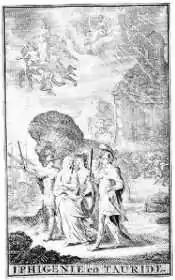Iphigénie en Tauride (English: Iphigeneia in Tauris) is an opera by the French composers Henri Desmarets and André Campra. It takes the form of a tragédie en musique in a prologue and five acts. The libretto is by Joseph-François Duché de Vancy with additions by Antoine Danchet. Desmarets had begun work on the opera around 1696 but abandoned it when he was forced to go into exile in 1699. Campra and his regular librettist Danchet took up the piece and wrote the prologue, most of Act Five, two arias in Act One, an aria for Acts Two and Three, and two arias for the fourth act. The plot is ultimately based on Euripides' tragedy Iphigeneia in Tauris.
Performance history
Iphigénie was first performed by the Académie royale de musique at the Théâtre du Palais-Royal in Paris on 6 May 1704 with Françoise Journet as Iphigénie and Gabriel-Vincent Thévenard as Oreste. It was coolly received at first, but enjoyed several revivals in the 18th century, the last being in 1762.
Roles

| Role | Voice type | Premiere cast, 6 May 1704 |
|---|---|---|
| L'ordonnateur des jeux/L'Océan | basse-taille (bass-baritone) | Charles Hardouin |
| Diane | dessus (soprano) | Julie d'Aubigny, known as La Maupin[1] |
| An inhabitant of Délos | haute-contre | Jean Boutelou |
| Iphigénie | dessus | Mlle Desmatins |
| Électre | dessus | Mlle Armand |
| Oreste | basse-taille | Gabriel-Vincent Thévenard |
| Pylade | haute-contre | M Poussin[2] |
| Triton | haute-contre | Pierre Chopelet |
| Thoas | bass | Jean Dun (père) |
| Isménide | dessus | Mlle Bataille |
| Le grand sacrificateur | taille (baritenor) | Louis Mantienne |
Recordings
Complete recording scheduled by Le Concert Spirituel, the Centre de musique baroque de Versailles, the Théâtre des Champs-Élysées in 2025 under Hervé Niquet.[3]
References
- Notes
- ↑ Mlle Maupin is commonly reported to have been the only major bas-dessus (mezzo-soprano/contralto) in the history of French opera in the seventeenth and eighteenth centuries; in the 1711 printed score, however, the part of Diane is notated in the soprano clef.
- ↑ Poussin, who was going shortly to die before his time, had been engaged by the Académie Royale de Musique as a haute-taille (baritenor) (Le magazin de l'opéra baroque, page: Cassandre), but, in the 1711 printed score, the role of Pylade is notated in the alto clef, and, in the numerous revivals of this opera, it was to be always performed by the principal hautes-contre of the company
- ↑ Henri Desmarest and André Campra - Iphigénie en Tauride (1704): Album release in 2025
- Sources
- Original libretto: Iphigénie en Tauride, Tragédie, Représentée pour la prémiere fois par l'Academie Royale de Musique, Le Mardi sixiéme jour de May 1704, Paris, Ballard, 1704 (accessible for free online at Gallica, Bibliothèque Nationale de France)
- 1711 printed score: Iphigénie en Tauride , tragedie mise en musique par Messieurs Desmarets, & Campra ; représentée pour la premiere fois par l'Academie royale de musique, le mardy sixiéme jour de may 1704. Remise au théatre le douziéme mars 1711, Paris, Ballard, 1711 (accessible for free online at Gallica, Bibliothèque Nationale de France)
- The Viking Opera Guide ed. Holden (Viking, 1993)
- Le magazine de l'opéra baroque, page: Iphigénie en Tauride, accessed 2 November 2009
- Casaglia, Gherardo (2005)."Iphigénie en Tauride, 6 May 1704". L'Almanacco di Gherardo Casaglia (in Italian).
